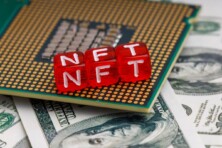Today, we’re going to shed light on some of the top NFT marketplaces

Top 5 NFT marketplaces to watch closely in 2022. Source: pexels.com
SpaceSeven
One of the newest entrants to the NFT world, this platform presents a lot of interest to potential traders. SpaceSeven is a multi-blockchain NFT marketplace. Primarily built on the Concordium smart contract enterprise blockchain platform, SpaceSeven allows for a combination of minimal and predictable gas fees with a 10x faster transaction speed. The marketplace is also packed with several game-changing features like ‘Universes’ that deliver unique experiences through exclusive customised galleries.
Concordium differs from other blockchains as it is designed with an identity layer built-in at the protocol level, enabling it to integrate with existing financial systems with user ID requirements. That will facilitate mass-market NFT adoption, allowing transactions with both crypto tokens and traditional payment means such as credit cards. Concordium blockchain also makes transactions highly secure, enabling full regulatory compliance, governance and transparency.
Thanks to Concordium’s two-layered consensus design, SpaceSeven remains secure if cybercriminals hijack less than 50% of its stake. The platform is following a proven methodology to ensure that the protocols are scientifically based and that there are no bugs in the software. In addition, it functions on the proof-of-stake model which is far more sustainable than the PoW.
OpenSea
The platform remains the leader in NFT sales. It experienced enormous growth this year, now processing more transactions daily than it did during the entire 2020. In 2021 so far, it’s estimated that OpenSea has already raised at least $235 million in revenue, with $204 million coming from the three months starting August. The marketplace couldn’t stay unnoticed by investors. In July, it raised $100 million in funding, becoming a unicorn with a $1.5 billion value.
Opensea is going to use fresh capital to expand its offerings of gaming items, digital art and collectables, event tickets, domain names, and millions of other assets backed by blockchains to new markets and audiences. In particular, the platform plans to bring support for several more blockchains including Dapper Labs’ Flow and Tezos. OpenSea already offers cross-blockchain support across Ethereum, Polygon and Klatyn. It also supports more than 150 different payment tokens, making NFT sales flexible and convenient.
As its core blockchain – Ethereum – is going to shift to the “proof of stake” model in the near future, OpenSea has every chance to make its leading position even stronger. The change will hugely drop transaction fees, possibly lowering the competition from all the parallel chains. Super-expensive Ethereum transaction costs are now driving users to find alternatives. With lower costs, the Ethereum blockchain will be harder to surpass. PoS will no longer require the energy of PoW, reducing the environmental impact of Ethereum by 99%, which will put the crypto in a more advantageous position for mass adoption. OpenSea will no doubt benefit from the change as well.
The company was founded in 2017 by Devin Finzer and Alex Atallah, experienced software engineers and cybersecurity professionals. Their P2P platform has surpassed the $10 billion mark in lifetime transaction volume.
The service has a few helpful features like NFT rankings by volume, floor price and other statistics, ‘Created’ tab showing NFTs an artist has made on tracked marketplaces, verified check marks on asset cards, and payments with debit or credit cards. There’s also a possibility for creators to decentralise their NFT metadata (media attachments and properties associated with NFTs) using the Interplanetary File System (IPFS) and Filecoin when creating on the platform.
BakerySwap
BakerySwap is the all-in-one DeFi platform that provides AMM DEX and NFT Marketplace solutions. While most NFT marketplaces function on Ethereum, this one was the first to launch on Binance Smart Chain (BSC) – the DeFi hub.
Users can exchange tokens, provide liquidity, stake and farm BAKE tokens, play the DeFi world games and win rewards, create NFT combos, play creative games and earn NFT tokens, as well as discover new creators from weekly interviews. Another unique feature of BakerySwap is the Launchpad that allows users to get access to newly launched projects on the Binance Smart Chain (BSC). The feature called IDO or Initial DEX Offering is for Battle pets, a blockchain-based game where players can breed, exchange and battle NFT pets on BSC. The NFT gallery section is an arm of BakerySwap’s NFT marketplace which gives users and fans access to curated artworks by celebrities and premier artists featured on BakerySwap.
Overall, the platform has a lot of gamification elements and a unique creative atmosphere that has helped this food-themed project quickly gain a prominent place in the DeFi ecosystem. In June, BakerySwap hit the 500,000 NFT transactions milestone mark. As of August, the platform registered over 1,400,000 NFT transactions and 500,000 mintings. It also managed to feature rare collectibles like the Maye Musk collection, the ONEPIECE or Marvel collectible NFTs.
The ongoing update to NFT Marketplace 3.0 brings users new useful features like multi-coin payment, advanced filtering and searching, or creating their own collections.
Axie Infinity
Axie Infinity may not be the biggest NFT marketplace in terms of trading volume, but it sure is the most popular one, boasting over 44,000 unique user accounts. The platform’s adoption skyrocketed lately with people looking for alternative ways to earn money during the COVID-19 pandemic. Axie Infinity has a peculiar play-to-earn (P2E) model. It enables people to earn real money from playing games and/or performing other services in the gaming environment using cryptocurrency. This emerging trend has caused a lot of hype and promises to be the next big thing in the NFT industry.
Since owning the game characters (Axies) is quite expensive, the platform has a popular practice called the scholarship system. Some players may approach users with access to Axies and make a deal to play on their behalf for a share of the profit. For the NFT owner, this model provides an opportunity to earn passive income. Scholars, in their turn, are making active income without additional investments. Player guilds, like YGG, Avocado Guild, and GuildFi, allow users to borrow Axie NFTs, with a revenue share system. They are said to have between 1,000 to 6,000 scholars.
Per rough estimations, Axie is making $1.5 billion in annual revenue, trading at a $3 billion market cap and at a $30 billion fully diluted market cap. Its popularity is heated up by the Metaverse hype. In addition, people from regions like Southeast Asia, specifically Philippines and Vietnam, are actively using Axie Infinity for money-earning. This metaverse game is fueling a digital economy based on crypto assets in those locations where banking services are hard to access and often expensive.
Magic Eden
Magic Eden is the leading marketplace on Solana which has 350K unique visitors a day. Those users are also very active traders. Namely, the NFT marketplace registered around 2 million transactions in the past 30 days.
The SOL blockchain itself currently is the fastest-growing crypto ecosystem. Therefore, the new marketplace has also seen explosive growth in 2021. Its trading volume grew by 1,168% in a few months of existence. Less than two weeks after Magic Eden’s launch on Sep. 18, the 24-hour trading volume hit a high of over 50,000 SOL, i.e. $7.5 million. Hence, the platform now boasts of over 50% market share on Solana.
With lower gas fees, the marketplace caters to a different audience than NFT behemoths like OpenSea. Mainly, the users are collectors favouring lower-cost NFTs and higher velocity trading. The average transaction on Magic Eden is $96.50 whereas OpenSea users spend on average $1,872 in one transaction. It’s no wonder that Magic Eden’s daily transaction numbers are 2-3x higher than those of the industry leader. With the abundance of low-cost NFT items and low gas fees, Magic Eden users transact about 6 times per day, on average, versus 2 times per day on OpenSea.
SEE ALSO:









